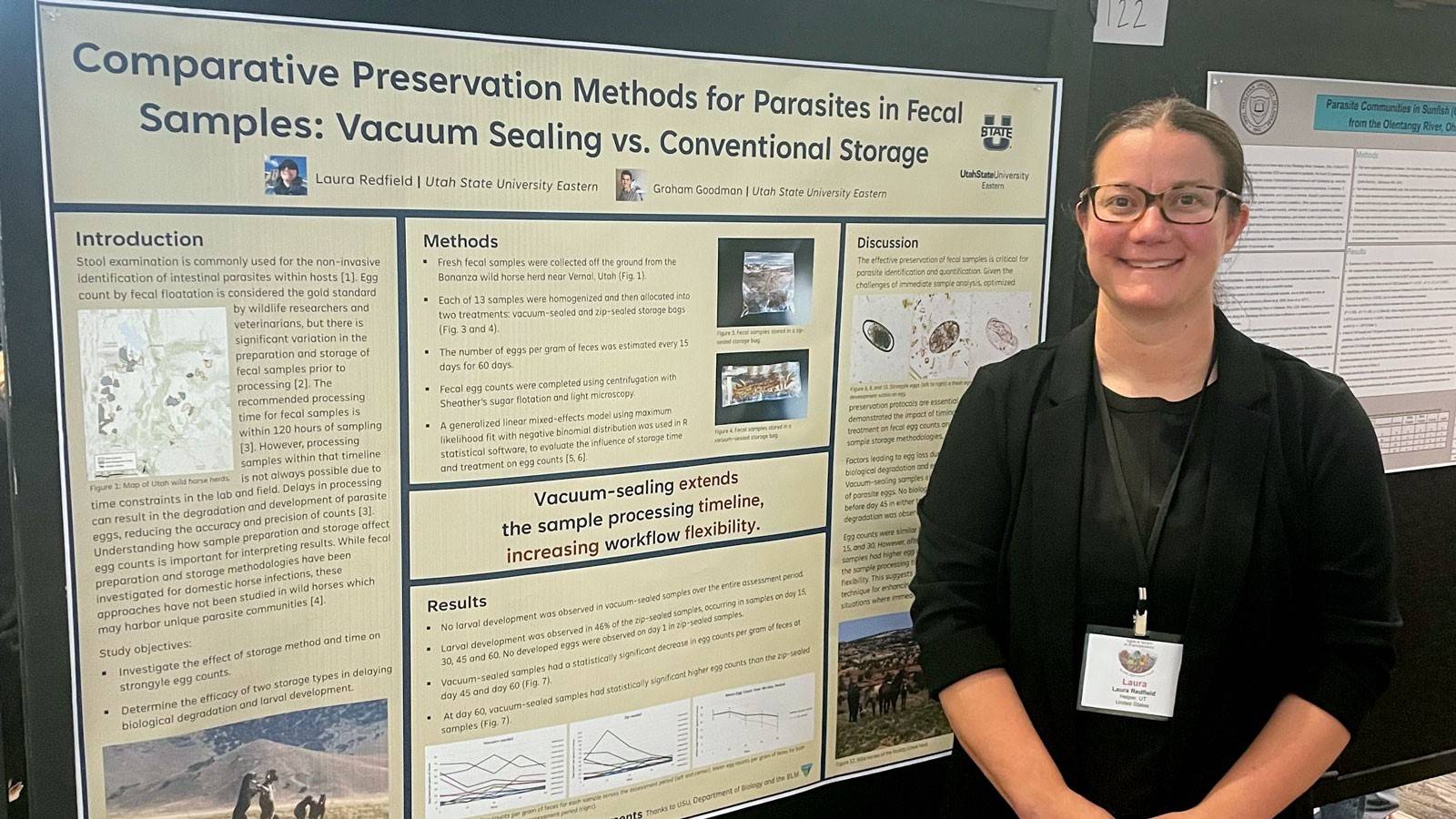USU Eastern Press Release
PRICE, Utah — Utah State University Eastern undergraduate student Laura Redfield was awarded a meritorious student poster award for her research on parasites in the wild horse population in Utah.
Redfield received the award at the annual American Society of Parasitologists meeting in Denver. Competing mostly against graduate students, Redfield took home the second-place prize.
“She was entered in the student competition against 40-50 other students, most of whom were graduate students,” said Graham Goodman, assistant professor of biology at USU Eastern. “I am not surprised at her success in the contest, because she is an incredible researcher and science communicator. She is able to synthesize information she has gathered from different sources and observations and present them in a cohesive, well-thought-out way.”
Redfield worked as a research assistant for Goodman during her time at USU Eastern. The pair regularly collected fecal samples from wild horse populations in Utah to determine levels of parasite infection. The poster documented findings on how quickly stool samples need to be examined for parasites before they degrade, and how different storage methods change that viability timeframe.
“I was interested in examining two fecal sample treatment types: vacuum-sealing versus zip-bag sealing fecal samples and their impact on parasite egg deterioration and development,” Redfield said. “The goal was to determine a way to extend the timeline of sample processing without compromising egg count results. Sampling included several hours of driving to locate the wild horses and then several hours of collecting fresh fecal samples.
After that, the experiment involved a lot of waiting.
“I ran samples every 15 days for a 60-day period. Samples were run on days 1, 15, 30, 45 and 60. Each run session took approximately 5 hours. After that it was data analysis, and poster design. These steps represent approximately 50 hours of work. So, altogether, I spent approximately 90 hours producing the poster.”
Goodman and Redfield found that these samples do not need to be processed immediately, if they are stored correctly. Samples are typically taken and then shipped to a lab to be processed within five days. Redfield documented that if the samples are vacuum sealed once gathered, they will degrade at a slower pace without affecting parasite eggs, thus making them easier to identify types and severity of infection. They found that vacuum sealed samples can stay viable for up to 30 days, much longer than if they are just collected in zipper plastic bags.
According to Goodman, this is the first such research being done with wild horses. He says the impacts of their findings allow greater flexibility for researchers and students. By this alternative storage method, samples do not need to be rushed to the lab, and students with flexible and hectic schedules will still have time to do their research without having as strict a timeframe to begin processing samples.
Goodman praised the work of Redfield, giving credit for the work and research she contributed to. He feels the findings completely change how research in this area can now be done.
“The work that Laura has done has been integral to this project,” Goodman said. “Her work is critical to my research, and she was engaged in every aspect. These findings allow us to extend the timeline for when we need to process samples, which is invaluable when it comes to research. This will allow us to continue to gather and find more samples in any given timeframe.”
Redfield graduated in December 2023 and will now look to enter graduate school in the fall. She says that working at the USU lab with other researchers and mentors was a great experience, and a valuable one for her future career and education.
“I love research,” Redfield said. “It has been wonderful to work with a variety of organisms and ask so many interesting questions. But the best part about undergraduate research has been working in partnership with professionals, students and professors who have unique perspectives, skills and experience to learn from.”
USU Eastern offers a 4-year biology degree, with emphases in biology, cellular/molecular biology, ecology and evolutionary biology and human biology. Biologists can find careers in research, healthcare, teaching, science writing, administration and management, government and industry. To learn more about degree options, visit www.usu.edu/degrees-majors/biology_bs_ba.

